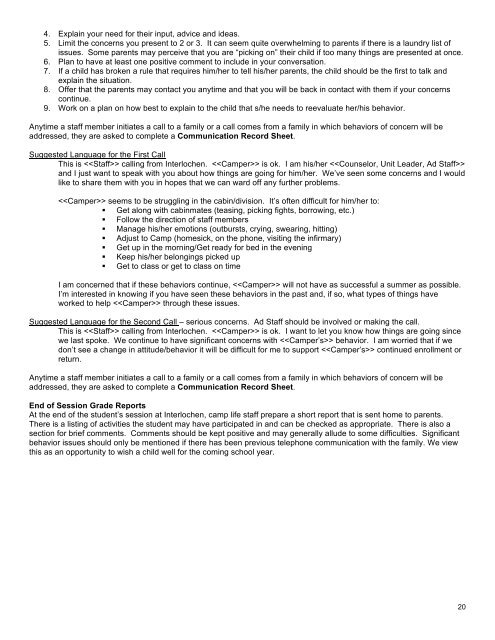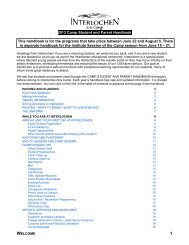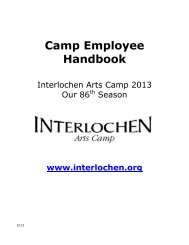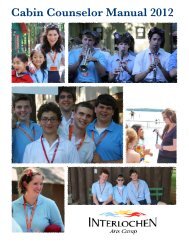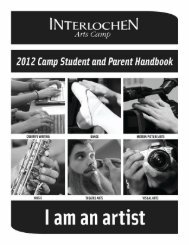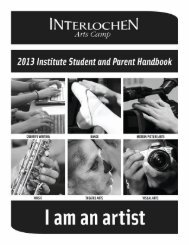Cabin Counselor Manual 2013 Final - Interlochen Center for the Arts
Cabin Counselor Manual 2013 Final - Interlochen Center for the Arts
Cabin Counselor Manual 2013 Final - Interlochen Center for the Arts
Create successful ePaper yourself
Turn your PDF publications into a flip-book with our unique Google optimized e-Paper software.
4. Explain your need <strong>for</strong> <strong>the</strong>ir input, advice and ideas.<br />
5. Limit <strong>the</strong> concerns you present to 2 or 3. It can seem quite overwhelming to parents if <strong>the</strong>re is a laundry list of<br />
issues. Some parents may perceive that you are “picking on” <strong>the</strong>ir child if too many things are presented at once.<br />
6. Plan to have at least one positive comment to include in your conversation.<br />
7. If a child has broken a rule that requires him/her to tell his/her parents, <strong>the</strong> child should be <strong>the</strong> first to talk and<br />
explain <strong>the</strong> situation.<br />
8. Offer that <strong>the</strong> parents may contact you anytime and that you will be back in contact with <strong>the</strong>m if your concerns<br />
continue.<br />
9. Work on a plan on how best to explain to <strong>the</strong> child that s/he needs to reevaluate her/his behavior.<br />
Anytime a staff member initiates a call to a family or a call comes from a family in which behaviors of concern will be<br />
addressed, <strong>the</strong>y are asked to complete a Communication Record Sheet.<br />
Suggested Language <strong>for</strong> <strong>the</strong> First Call<br />
This is calling from <strong>Interlochen</strong>. is ok. I am his/her <br />
and I just want to speak with you about how things are going <strong>for</strong> him/her. We’ve seen some concerns and I would<br />
like to share <strong>the</strong>m with you in hopes that we can ward off any fur<strong>the</strong>r problems.<br />
seems to be struggling in <strong>the</strong> cabin/division. It’s often difficult <strong>for</strong> him/her to:<br />
Get along with cabinmates (teasing, picking fights, borrowing, etc.)<br />
Follow <strong>the</strong> direction of staff members<br />
Manage his/her emotions (outbursts, crying, swearing, hitting)<br />
Adjust to Camp (homesick, on <strong>the</strong> phone, visiting <strong>the</strong> infirmary)<br />
Get up in <strong>the</strong> morning/Get ready <strong>for</strong> bed in <strong>the</strong> evening<br />
Keep his/her belongings picked up<br />
Get to class or get to class on time<br />
I am concerned that if <strong>the</strong>se behaviors continue, will not have as successful a summer as possible.<br />
I’m interested in knowing if you have seen <strong>the</strong>se behaviors in <strong>the</strong> past and, if so, what types of things have<br />
worked to help through <strong>the</strong>se issues.<br />
Suggested Language <strong>for</strong> <strong>the</strong> Second Call – serious concerns. Ad Staff should be involved or making <strong>the</strong> call.<br />
This is calling from <strong>Interlochen</strong>. is ok. I want to let you know how things are going since<br />
we last spoke. We continue to have significant concerns with behavior. I am worried that if we<br />
don’t see a change in attitude/behavior it will be difficult <strong>for</strong> me to support continued enrollment or<br />
return.<br />
Anytime a staff member initiates a call to a family or a call comes from a family in which behaviors of concern will be<br />
addressed, <strong>the</strong>y are asked to complete a Communication Record Sheet.<br />
End of Session Grade Reports<br />
At <strong>the</strong> end of <strong>the</strong> student’s session at <strong>Interlochen</strong>, camp life staff prepare a short report that is sent home to parents.<br />
There is a listing of activities <strong>the</strong> student may have participated in and can be checked as appropriate. There is also a<br />
section <strong>for</strong> brief comments. Comments should be kept positive and may generally allude to some difficulties. Significant<br />
behavior issues should only be mentioned if <strong>the</strong>re has been previous telephone communication with <strong>the</strong> family. We view<br />
this as an opportunity to wish a child well <strong>for</strong> <strong>the</strong> coming school year.<br />
20


